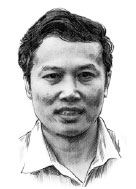Epidemic draws world attention to Africa's needs
Updated: 2014-12-31 08:48
By Zhang Tiankan(China Daily USA)
|
||||||||
'The story ended with a whole world in panic; it began in a small village in Africa." This sentence in the German magazine Zeit best describes the fatal nature of the Ebola epidemic. Since its outbreak in West Africa in February, Ebola had infected 17,145 people globally by Dec 4, out of which 6,070 died.
The epidemic, in more ways than one, has exposed the cost of inequalities in world healthcare services. In its 1978 Alma Ata Declaration, the World Health Organization vowed to provide "a level of health that will permit them to lead a socially and economically productive life" to "all peoples of the world" by 2000. Yet 14 years after the deadline, basic healthcare is still an illusion for people in many parts of Africa.
Ebola spreads by direct contact with blood or other body fluids of an infected human or animal, and could be prevented through not-so complicated quarantine measures. But the fact is, only 18 percent of Ebola patients in Liberia receive treatment in hospitals, health centers or quarantine facilities. Even in the capital Monrovia, some Ebola patients could not gain admittance to medical centers because of overcrowding and, as a result, their entire families were infected by and succumbed to the virus. Worse, the health centers don't even have proper sanitized and protected vehicles to carry the bodies of Ebola victims.
It should be noted that Ebola, being a self-limiting disease, does not necessarily lead to death. Many of the victims died not of fatal hematorrhea (profuse hemorrhage) but because of extreme dehydration; intravenous infusion could have saved them but such treatment is a luxury in many countries in West Africa.
A look at history would reveal that the Ebola virus had been sending warnings for a long time. As early as 1976, an Ebola outbreak in Zaire left 280 people dead. It was followed by smaller outbreaks over the years. But since the virus mainly attacked the poorer parts of the world, it failed to draw international attention and prompt multinational medical giants to start research into preventive and curative medicines and vaccines until it threatened Europe and the United States.
These facts show Africa remains an isolated island in terms of healthcare and medical technology. The world did not care about the continent and its people until the cost of neglecting the virus threatened to turn many in even the developed into victims.
Even in terms of culture, which is essential for disease prevention, Africa is isolated. Research shows that a popular burial ceremony in Africa, in which people kiss and touch the deceased before bidding them a final goodbye, accelerates the spread of the disease.

If that cultural tradition is allowed to continue, the international community could at least take measures to stop another tradition, that of hunting and eating wild animals, because the animals they eat, such as cane rats, bats, monkeys, chimpanzees and even lions, could carry unknown viruses, of which Ebola is only one. The international community needs to provide more help to African communities so that they can get their food from other sources and don't have to depend on wild animals for sustenance.
Fortunately, increasingly more nations are realizing that we live on the same planet as Africa and diseases do not respect borders. The international community has invested huge amounts of money, technologies and personnel to strengthen the healthcare system in Africa, and also provided the continent with medicines and vaccines.
The US has completed the first round of human trials of the anti-Ebola vaccine with satisfying results. With second- and third-round trials to be carried out in West Africa in February and March, the spread of Ebola can hopefully be controlled.
Of course, the process of bringing the Ebola virus under control will be long. And the long process of helping Africa build its healthcare system could help the continent to emerge out of isolation.
The author is deputy editor-in-chief at Encyclopedic Knowledge and a former research scholar at Chinese Academy of Medical Sciences.
(China Daily USA 12/31/2014 page5)
- 'Miss Leisure World' candidates play war game
- Metro use drops slightly as new fare hikes kick in
- Record passenger numbers expected for upcoming chunyun
- Children step out of Daliang Mountain
- 1,000 years on, the art of fish hunting is in safe hands
- National Stadium illuminated to greet New Year countdown
- Death toll from tropical storm rises to 35 in Philippines
- Female fighters in the battle against IS
- China launches frigate for Bangladesh navy
- Divers set to search for AirAsia wreckage after debris, bodies found
- Nurse becomes first Ebola victim diagnosed in Britain
- Remote Canadian polar bear town arouses interest from China

 2014 Top news events in China
2014 Top news events in China
 Ten breakthroughs of China's military diplomacy in 2014
Ten breakthroughs of China's military diplomacy in 2014
 Creative colored drawings embrace New Year
Creative colored drawings embrace New Year
 Chongqing collective wedding applies for Guinness records
Chongqing collective wedding applies for Guinness records
 China Daily Pictures of the Year 2014
China Daily Pictures of the Year 2014
 New Year's Eve 2015: Celebrations around the world
New Year's Eve 2015: Celebrations around the world
 Top 10 happiest cities in China 2014
Top 10 happiest cities in China 2014
 Children step out of Daliang Mountain
Children step out of Daliang Mountain
Most Viewed
Editor's Picks

|

|

|

|

|

|
Today's Top News
Shares of CNR, CSR surge after merger
Fosun to buy Meadowbrook Insurance for about $433m
Doyers Street: Hallowed ground in New York's Chinatown
US denies reports about proposed prisoner swap with Iran
Remote Canadian polar bear town arouses interest from China
Year of cooperation marks US, China relations
Xiaomi's sky-high value also comes with potential obstacles
Bright lights for Chinese artists
US Weekly

|

|





